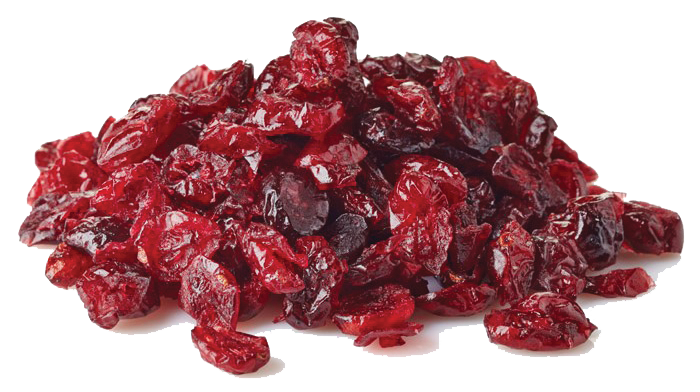Dried cranberries are more than just a sweet, chewy snack—they are packed with nutrients and powerful compounds that offer numerous health benefits.
While fresh cranberries are seasonal, dried cranberries provide a convenient way to enjoy the advantages of this fruit year-round.
Below is a detailed exploration of how dried cranberries can support various aspects of health, along with tips for safe consumption.

1. Rich in Antioxidants to Fight Free Radicals
Dried cranberries contain high levels of antioxidants, such as polyphenols and flavonoids.
These compounds play a key role in neutralizing free radicals—unstable molecules that can damage cells and contribute to aging and diseases like cancer and heart disease.
By reducing oxidative stress, regular consumption of dried cranberries helps the body maintain healthier cells and tissues over time.
Antioxidants also support cognitive function by protecting brain cells from age-related damage, which may lower the risk of neurodegenerative diseases such as Alzheimer’s.
2. Supports Urinary Tract Health
Cranberries are widely known for their ability to prevent urinary tract infections (UTIs).
They contain unique compounds called proanthocyanidins, which reduce the likelihood of harmful bacteria, such as E. coli, attaching to the walls of the urinary tract.
This makes cranberries particularly beneficial for individuals prone to recurring infections.
While most studies highlight fresh or juiced cranberries, dried cranberries still retain some of these protective benefits.
Adding a handful of dried cranberries to your diet regularly may help maintain urinary health, although they should not replace medical treatment if an infection occurs.
3. Promotes Digestive Health
The fiber content in dried cranberries aids digestion by promoting bowel regularity and preventing constipation.
Dietary fiber supports the growth of beneficial gut bacteria, contributing to a balanced gut microbiome, which plays a crucial role in overall health.
A healthy digestive system also reduces the risk of gastrointestinal issues like bloating and irritable bowel syndrome (IBS).
Furthermore, fiber-rich diets are linked to lower cholesterol levels, enhancing heart health while improving digestive function.
4. Boosts Heart Health
Dried cranberries contain heart-protective nutrients, such as flavonoids, anthocyanins, and fiber, which improve cardiovascular health.
These compounds help lower LDL cholesterol (the “bad” cholesterol) and promote better blood flow by relaxing blood vessels.
Consuming cranberries regularly may reduce the risk of hypertension, stroke, and heart attacks.
In addition, cranberries’ anti-inflammatory properties further support heart health by reducing chronic inflammation, which can damage blood vessels and lead to heart disease over time.
5. Anti-Inflammatory
Some compounds in dried cranberries have natural anti-inflammatory effects.
This makes them useful in reducing symptoms of chronic inflammatory conditions, such as arthritis or asthma.
Chronic inflammation has also been linked to diseases like diabetes and heart disease, highlighting the importance of anti-inflammatory foods in the diet.
Cranberries are rich in vitamin C, an essential nutrient for a robust immune system.
Eating vitamin C-rich foods helps the body fight off infections and recover faster from illnesses like the flu or common cold.
6. Natural Energy Source
Dried cranberries are high in natural sugars, making them an excellent snack for those needing a quick energy boost.
Athletes and individuals with active lifestyles often rely on dried fruits like cranberries for sustained energy during workouts or long hikes.
The combination of carbohydrates and antioxidants makes them a great choice for replenishing energy stores without consuming heavy meals.
Adding dried cranberries to trail mixes or granola bars ensures a steady supply of energy throughout the day.
7. Contributes to Oral Health
Despite their chewy texture, cranberries may promote dental health by preventing harmful bacteria from forming plaque on teeth and gums.
Research indicates that some cranberry compounds hinder the growth of bacteria responsible for cavities and gum disease.
However, care must be taken when eating sweetened dried cranberries, as excessive sugar can lead to tooth decay if proper oral hygiene is not maintained.
Rinsing your mouth with water after consuming dried cranberries can help prevent any sugar from lingering on your teeth.
8. Supports Weight Loss
While dried cranberries contain natural sugars, they can help control cravings by offering a healthier alternative to candy or sugary snacks.
The fiber in cranberries promotes a feeling of fullness, reducing the likelihood of overeating.
When consumed in moderation, dried cranberries can complement a balanced diet, supporting long-term weight loss goals.
Pairing dried cranberries with protein-rich foods like nuts or yogurt can further stabilize blood sugar levels, preventing energy crashes and hunger pangs.
How to Add Dried Cranberries to Your Diet
- Breakfast: Sprinkle them over oatmeal, cereals, or yogurt.
- Snacks: Combine them with nuts or seeds for a quick trail mix.
- Salads: Add them to leafy green salads for a burst of sweetness.
- Baked Goods: Use them in cookies, muffins, or bread for extra flavor.
- Savory Dishes: Include them in pilafs or stuffings for a unique twist.
These versatile berries pair well with both sweet and savory foods, making it easy to integrate them into your meals.
Precautions When Consuming Dried Cranberries
- Watch for Added Sugar: Many dried cranberries are sweetened, which can increase calorie and sugar intake. Opt for unsweetened varieties or those sweetened with fruit juice to minimize excess sugar.
- Acidic Content: Cranberries are acidic, so individuals with acid reflux or sensitive teeth should consume them in moderation. Drinking water afterward can help neutralize the acidity.
- Moderate Portion Sizes: Although nutritious, dried cranberries are calorie-dense. A small handful (about 1/4 cup) is usually enough to enjoy the benefits without overindulgence.



